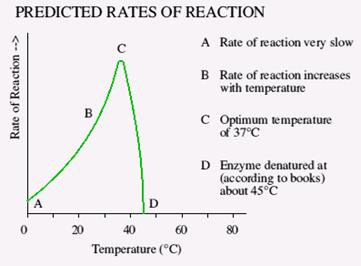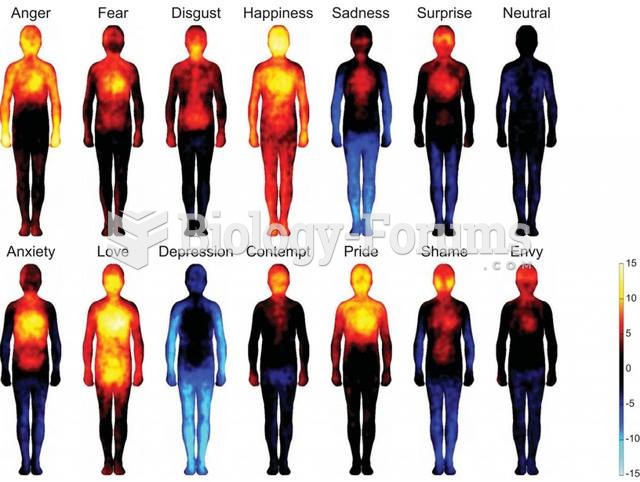|
Replies
|
wrote...
|
|
|
9 years ago
I would like to know on how this minor heat affects chemical reaction within our body. Our bodies work optimally at around 37°C. The average normal body temperature is generally accepted as 98.6°F (37°C). A temperature over 100.4°F (38°C) usually means you have a fever caused by an infection or illness. I've learned that heat increases the efficiency of the immune response, hence the increase in temperature when a person is ill.
|
|
|
|
|
|
|
|
|
wrote...
|
|
|
9 years ago
Our bodies work optimally at around 37°C. The average normal body temperature is generally accepted as 98.6°F (37°C). A temperature over 100.4°F (38°C) usually means you have a fever caused by an infection or illness.
I've learned that heat increases the efficiency of the immune response, hence the increase in temperature when a person is ill.
Hypothermia is a condition in which the body's core temperature drops below that required for normal metabolism and body functions. This is generally considered to be less than 35.0 °C (95.0 °F). I would like to know on why heart beat would be slower and unstable, which part of body control the heart beat, if temperature drops, how do temperature affect this process in chemical aspects? Do you have any suggestions? Thank you very much for any suggestions :>
|
|
|
|
|
|
|
wrote...
|
|
|
9 years ago
|
Cold weather slows down metabolic processes, including the action of enzymes, etc. Lower metabolism means slower heartbeat.
|
|
|
|
|
|
|
|
|
wrote...
|
|
|
9 years ago
Cold weather slows down metabolic processes, including the action of enzymes, etc. Lower metabolism means slower heartbeat.
Do you have any suggestions on what the required minimum temperature for enzymes work within our body? Do you have any suggestions? Thank you very much for any suggestions :>
|
|
|
|
|
|
|
wrote...
|
|
|
9 years ago
Well, some enzymes are more resistant to temperature fluctuations. This graph should give you an idea... 
|
|
|
|
|
|
|
|
|
wrote...
|
|
|
9 years ago
Well, some enzymes are more resistant to temperature fluctuations. This graph should give you an idea...
Do you have any suggestions on what happen to our body if I get fever at 45 C? On the other hands, if I swim on winter and my body gets temperature at 20 C, the reaction drops more than 50%, what happen to our body? Do you have any suggestions? Thank you very much for any suggestions :>
|
|
|
|
|
|
|
wrote...
|
|
|
9 years ago
Do you have any suggestions on what happen to our body if I get fever at 45 C?
On the other hands, if I swim on winter and my body gets temperature at 20 C, the reaction drops more than 50%, what happen to our body? Your enzymes would denature past 41, your brain would shut down, go into heat shock. As the temperature drops, blood is shunted away from the peripheries, and allocated to the vital organs.
|
|
|
|
|
|
|
|
|
wrote...
|
|
|
9 years ago
heat increases the efficiency of the immune response, hence the increase in temperature when a person is ill. Your enzymes would denature past 41, your brain would shut down, go into heat shock.
As the temperature drops, blood is shunted away from the peripheries, and allocated to the vital organs.
Would heat increases the efficiency of enzymes? If temperature gets higher, what cause the problem on chemical reaction for enzymes? Do you have any suggestions on why enzymes are only efficient within a range of temperature? Thank you very much for any suggestions :>
|
|
|
|
|
|
|
wrote...
|
|
|
9 years ago
Would heat increases the efficiency of enzymes? Not past their breaking point, especially not those in the brain. If temperature gets higher, what cause the problem on chemical reaction for enzymes? The shape of the enzyme would get distorted, effecting the reaction efficiency.
|
|
|
|
|
|
|
|
|
wrote...
|
|
|
9 years ago
Edited: 9 years ago, oem7110
Thank you very much for suggestions :> As the temperature drops, blood is shunted away from the peripheries, and allocated to the vital organs.
When I feel angry, I take a cold shower, and my emotion seems to calm down. I would like to know on how emotion directly related to lower temperature. Is emotion involved with any chemical reaction of enzyme? If yes, then would following statement be valided? If you feel angry, take a cold shower, which would constrict the blood vessels. If you feel depressed / stress, take a warm/hot shower, which would dilate the blood vessels. Do you have any suggestions? Thank you very much for any suggestions :>
|
|
|
|
|
|
|
wrote...
|
|
|
9 years ago
Emotions can increase or decrease body temperature due to vasoconstriction and vasodialtion. For instance, some can use their imagination to dream of a place that is hot, and in turn their body temperature rises. https://biology-forums.com/index.php?article=612
|
|
|
|
|
|
|
|
|
wrote...
|
|
|
9 years ago
Edited: 9 years ago, oem7110
Emotions can increase or decrease body temperature due to vasoconstriction and vasodialtion. For instance, some can use their imagination to dream of a place that is hot, and in turn their body temperature rises. https://biology-forums.com/index.php?article=612If emotion can affect on body temperature, and temperature can affect on the reaction of enzymes, so emotion can affects the reaction of enzymes. Would it be corrected logic?  Referring to above image, I would like to know why happy emotion related to body heat, is the body temperature closed to 37 degree (optimized temperature for enzymes)? but the image does not show the temperature in degree, so there is no way to know what degree of temperature related to love/happy emotion. Any suggestions on how temperature relates to love/happy emotion? On the other hands, Seasonal affective disorder (SAD), also known as winter depression, winter blues, summer depression, summer blues. For winter blues, it is very easy to explain by reducing the reaction of enzymes with lower temperature, but for summer blues, it does not make any sense from enzymes' view points. Do you have any suggestions? Thank you very much for any suggestions :>
|
|
|
|
|
|
|
wrote...
|
|
|
9 years ago
If emotion can affect on body temperature, and temperature can affect on the reaction of enzymes, so emotion can affects the reaction of enzymes. Would it be corrected logic? Yes, that makes sense. Referring to above image, I would like to know why happy emotion related to body heat, is the body temperature closed to 37 degree (optimized temperature for enzymes)? but the image does not show the temperature in degree, so there is no way to know what degree of temperature related to love/happy emotion. Any suggestions on how temperature relates to love/happy emotion? The image was obtained from this study, which you can read for free: http://www.pnas.org/content/111/2/646.full.pdf+html They hypothesize a little but as to why this occurs. On the other hands, Seasonal affective disorder (SAD), also known as winter depression, winter blues, summer depression, summer blues.
For winter blues, it is very easy to explain by reducing the reaction of enzymes with lower temperature, but for summer blues, it does not make any sense from enzymes' view points. This has to do with serotonin: https://biology-forums.com/index.php?article=1025
|
|
|
|
|
|
|
|
|